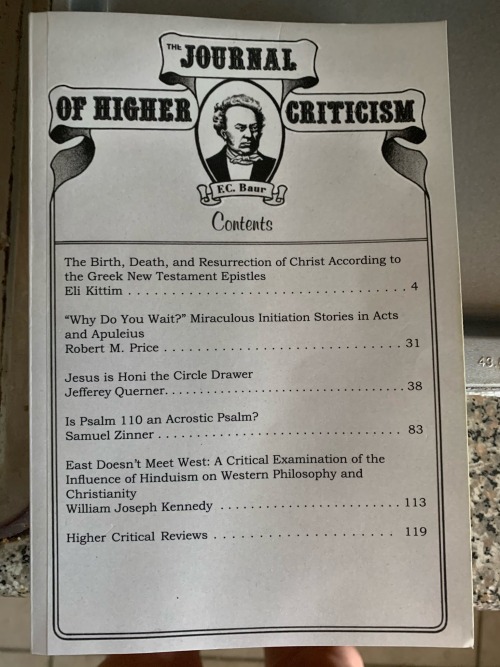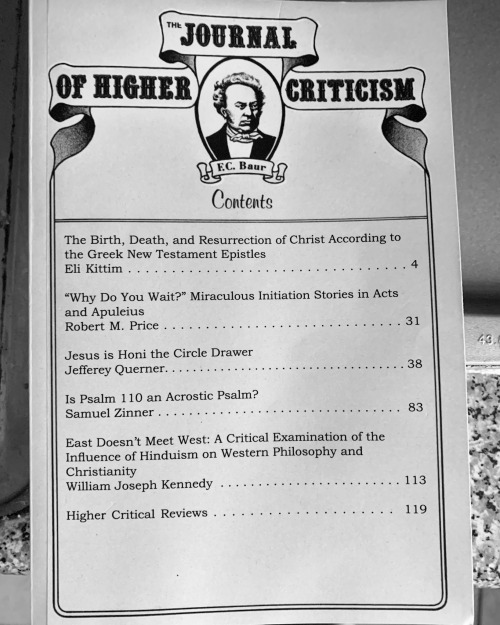SBL - Tumblr Posts

OPEN ACCESS AND THE BIBLE: The Bible and Interpretation
This is Eli Kittim’s academic monograph——published in the Journal of Higher Criticism, vol. 13, no. 3 (2018), page 4—-entitled, "The Birth, Death, and Resurrection of Christ According to the Greek New Testament Epistles."
To view or purchase, click the following link:
https://www.amazon.com/Journal-Higher-Criticism-13-Number/dp/1726625176
_______________________________________________

The Birth, Death, and Resurrection of Christ According to the Greek New Testament Epistles
Published in the Journal of Higher Criticism, vol. 13, no. 3 (2018)
By Award-Winning Goodreads Author Eli Kittim 🎓
https://acrobat.adobe.com/link/review?uri=urn:aaid:scds:US:6b2a560b-9940-4690-ad29-caf086dbdcd6

Was the Septuagint Destroyed When the Library of Alexandria Was Burnt Down in 48 BC?
By Author Eli Kittim 🎓
The Argument
Some people (typically Jewish apologists) claim that the Septuagint doesn’t exist because it was destroyed when the Library of Alexandria was burnt down in 48 BC.
This conclusion, however, is both textually misleading & historically erroneous.
First
The Alexandrian Library and its collection were not entirely destroyed. We have evidence that there was only partial damage and that many of its works survived. According to Wiki:
The Library, or part of its collection, was
accidentally burned by Julius Caesar during
his civil war in 48 BC, but it is unclear how
much was actually destroyed and it seems
to have either survived or been rebuilt
shortly thereafter; the geographer Strabo
mentions having visited the Mouseion in
around 20 BC and the prodigious scholarly
output of Didymus Chalcenterus in
Alexandria from this period indicates that
he had access to at least some of the
Library's resources.
Second
The Septuagint had already been written and disseminated among the diaspora since the 3rd century BC, and so many of its extant copies were not housed in the Library of Alexandria per se.
Third
Textual Criticism confirms that the New Testament authors used the Septuagint predominantly and quoted extensively from it. If the Septuagint didn’t exist, where did the New Testament authors copy from? And how do you explain the fact that the New Testament and the Septuagint often have identical wording in their agreements?
Fourth
The Dead Sea Scrolls also demonstrate that the Septuagint was far more accurate than the 10th-century-AD Masoretic text. See, for example, the textual controversy surrounding Deuteronomy 32:8. Both the Dead Sea Scrolls and the Septuagint have “sons of God.” The Masoretic text is demonstrably inaccurate because it has “sons of Israel,” a later redaction. Israel didn’t even exist at that time!
Fifth
Emanuel Tov, a leading authority on the Septuagint who has explained the various textual families (or text-types) of the Old Testament, never once mentioned that we lost the Septuagint, or that it was destroyed, or that it was no longer in circulation. On the contrary, he claims that it continued to be in use during the Christian period and that it is much more older than the 10th-century-AD Masoretic text, which the Jews call the “Hebrew Bible.”
Sixth
If the Septuagint was completely destroyed, as some have erroneously suggested, from where were the later revisionists and translators copying from? We have historical evidence that they were, in fact, copying from the Septuagint itself. Wiki writes:
Theodotion … was a Hellenistic Jewish
scholar, … who in c. 150 CE translated the
Hebrew Bible into Greek. … Whether he was
revising the Septuagint, or was working
from Hebrew manuscripts that represented
a parallel tradition that has not survived, is
debated.
So there’s evidence to suggest that the Theodotion version is a possible *revision* of the Septuagint. This demonstrates that the Septuagint existed in the second century AD! Otherwise, where was Theodotion copying from if the Septuagint didn’t exist?
Seventh
The great work of Origen, Hexapla, compiled sometime before 240 AD, is further proof that the Septuagint was still in use in the 3rd century AD! Wikipedia notes the following:
Hexapla … is the term for a critical edition
of the Hebrew Bible in six versions, four of
them translated into Greek, preserved only
in fragments. It was an immense and
complex word-for-word comparison of the
original Hebrew Scriptures with the Greek
Septuagint translation and with other Greek
translations.
Encyclopedia Britannica adds:
In his Hexapla (“Sixfold”), he [Origen]
presented in parallel vertical columns the
Hebrew text, the same in Greek letters, and
the versions of Aquila, Symmachus, the
Septuagint, and Theodotion, in that order.
Eighth
Besides Origen’s Hexapla, we also have extant copies of the Septuagint. According to wiki:
Relatively-complete manuscripts of the
Septuagint postdate the Hexaplar
recension, and include the fourth-century-
CE Codex Vaticanus and the fifth-century
Codex Alexandrinus. These are the oldest-
surviving nearly-complete manuscripts of
the Old Testament in any language; the
oldest extant complete Hebrew texts date
to about 600 years later, from the first half
of the 10th century.
Ninth
There’s also historical and literary evidence that the Greek Septuagint was in wide use during the Christian period and beyond. Wiki says:
Greek scriptures were in wide use during
the Second Temple period, because few
people could read Hebrew at that time. The
text of the Greek Old Testament is quoted
more often than the original Hebrew Bible
text in the Greek New Testament
(particularly the Pauline epistles) by the
Apostolic Fathers, and later by the Greek
Church Fathers.
Tenth
Today, Biblical scholarship has a *critical edition* of the Septuagint. If it was destroyed in 48 BC, where did the critical edition come from? The Göttingen Septuaginta (editio maior) presents *a fully critical text* and should silence the skeptics and critics who try to mislead the public. They deliberately mislead the public by trying to discredit the far more reliable and much older Septuagint in order to get people to accept the much later Hebrew Masoretic text from the Middle Ages!